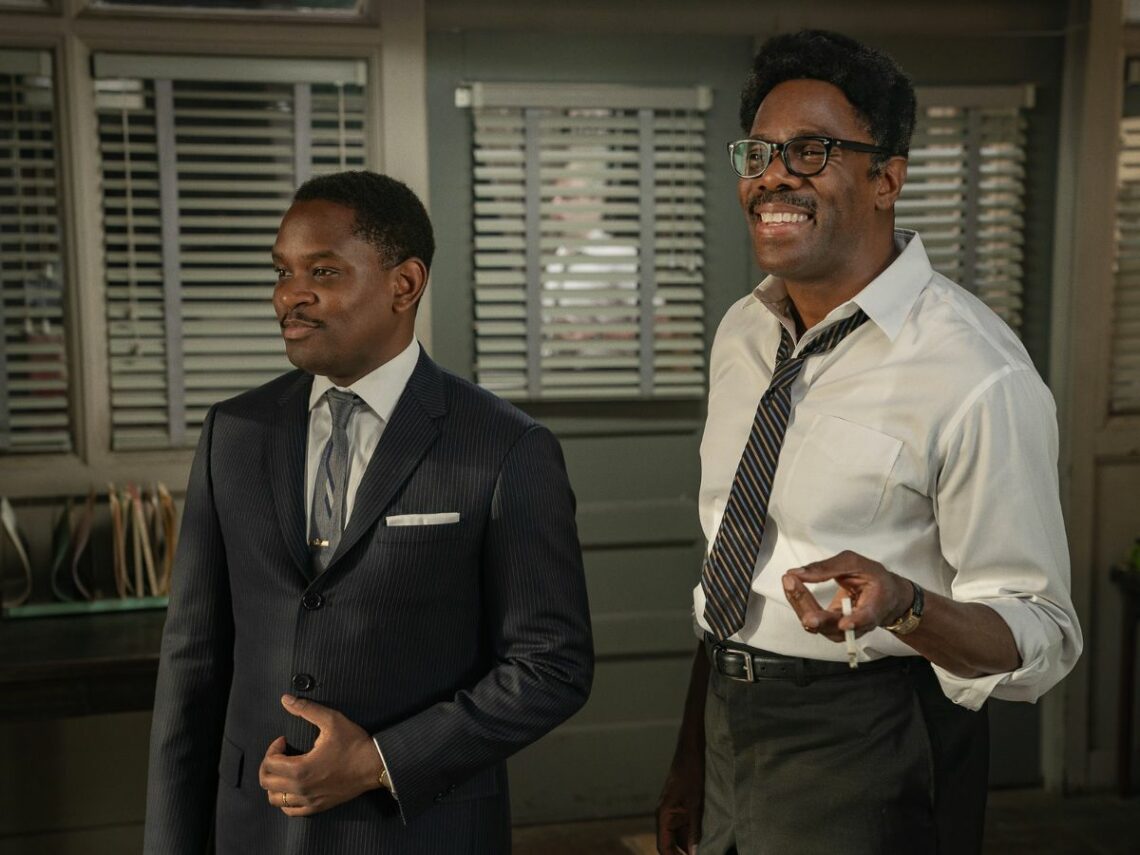Rustin deserves acknowledgement for bringing attention to a forgotten hero, Bayard Rustin. He was one of the very few openly gay figures in the civil rights movement, an influential advisor and strategist for leaders like Martin Luther King Jr. and the principal architect of the historic March on Washington in 1963.
Colman Domingo’s portrayal of Rustin is staggeringly good, and the film touches upon several pertinent issues. Even then, this George C. Wolfe directorial, produced by Barack and Michelle Obama, is marred by uneven direction and an imbalanced screenplay—by Julian Breece and Dustin Lance Black—that fails to provide the necessary gravitas to the monumental events surrounding Rustin. The film’s focus on Rustin entirely overshadows the larger historical context, diluting the momentous feeling of it all.
The film begins with the note that the US Supreme Court ruled segregation unconstitutional in 1954, followed by a montage of black folk (primarily women) and white allies being harassed by white supremacists. We have Ruby Bridges jauntily walking to school surrounded by heavily armoured men there for her protection, as well as Elizabeth Eckford of the Little Rock Nine group being heckled by anti-integration students like Hazel Bryan Massery. These are powerful images from history that show that social stigma remained despite law changes. Something society struggles with to this day.
However, this sets the tone for how the story will unfold in Rustin. Immediately after this assortment of historical snapshots, we are introduced to a cascade of characters who all played pivotal roles in making the moment that would lead to King’s colossal ‘I Have A Dream’ speech, which arrives towards the end of the film without offering much catharsis vexingly enough.
The largest peaceful protest to date, the march drew over 250,000 participants of all genders, colours, races, and religions. However, this fundamental message and core philosophy of Rustin’s—that any peace worth having cannot be acquired through violence—is reduced to clichéd dialogues and scenes throughout. Even the internal conflicts in the movement, ranging from personal politics, gender divide, and the exclusion of notable female pioneers of the civil rights movement, are treated as throwaway issues that get resolved without much friction or effort.
Rustin rushes past way too much at a breakneck pace while also trying to paint a portrait of a man who may not have been perfect in his personal life but was ardently dedicated to a greater cause. But even with its unequal balancing act, the film feels like a missed opportunity that fails to delve into Rustin’s very human imperfections. Domingo elevates the movie with his performance, but there’s only so much that can do for a film that, at points, feels like a college-level play on a Netflix budget with some of its characters cosplaying in period attire. It is not surprising that the Tony-winning Wolfe brings some of his theatricality from his Broadway days, but that does not make up for the surprising lack of chutzpah in the film. Chris Rock as Roy Wilkins, former NAACP leader and Rustin’s work rival-turned-ally in the movement, particularly sticks out like a sore thumb.
Rustin and Domingo’s energetic portrayal of him deserves one watch. History has ignored this man and his contributions for long enough. But the fact that he finally gets his due in such a forgettable film is emblematic of how history forgets all the nameless, faceless lionhearts who worked tirelessly to create the ripples that ultimately shook this world.
Rustin is not a terrible film by far, but it’s a frustratingly limited one when the scope was so vast. It makes for a decent device to brush up on facts easily found on Wikipedia on pages we wouldn’t know to open because we didn’t even know what to look for. Rustin has the look and sound of a sincere Oscar-bait biopic down pat, but the execution lets us down. If Domingo is indeed nominated for any of the prestigious awards he arguably deserves, he wouldn’t be the first to do so for a performance in a mediocre movie. After all, Sandra Bullock won her Oscar for the maudlinly contrived The Blind Side.
You can watch Rustin on Netflix and catch the trailer here:
